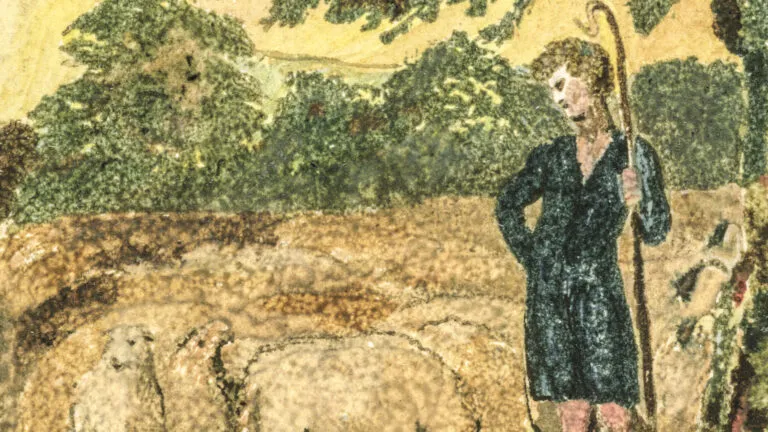I look forward to Holy Week with a mixture of dread and wonder. The dread because I know that as I listen to the biblical account read in church, I’ll have to relive the horrors of the crucifixion. The wonder because there are these miraculous signs that point to Jesus’ divinity and how he knew all along how things would turn out.
On Palm Sunday in our church, the gospel account is reenacted by members of the congregation. You can be there in your pew and suddenly discover that the friend sitting next to you is playing the role of Peter or Mary Magdalene or even Jesus. The familiar story comes alive.
READ MORE: 8 Prayers for Holy Week
Before entering Jerusalem, Jesus sends two of his disciples into the village of Bethany, where he has told them they will find a colt. They were to untie it and bring it back to him. If anyone asks them why they’re doing that, they are to say, “The Lord needs it and will send it back here immediately.”
Did those disciples ever ask themselves, “How does he know we’ll find a colt?” or “What if someone accuses us of stealing it?” In fact, they do find a colt in the street, tied near a door.
When bystanders accost them, asking what they’re doing, they say exactly what Jesus told them to say. And it works. It’s as though Jesus is training the disciples to trust him in the small matters so they will be able to trust him regarding the wonders to come.
The disciples throw their cloaks onto the colt, and Jesus sits on it. On his way into the city, the people throw their cloaks down on the ground or spread leafy branches cut from the fields. “Hosanna!” they cry, just as we do in church, waving palms to honor this new King.
READ MORE: Palm Sunday in the Bible: 15 Palm Sunday Scriptures
But what does this King have to offer his people? A second miracle tells us: That same busy week, Jesus passes a fig tree that has borne no fruit. He addresses the tree—as though it might hear him: “May no one ever eat fruit from you again.” By the next day, the fig tree has withered and died. What does it all mean to his followers? Jesus is illustrating the power of prayer. “So I tell you,” he says, “whatever you ask for in prayer, believe that you have received it, and it will be yours” (Mark 11:24). Believe that you have received it. What an astounding promise to come from a king.
Later that week, when an unnamed woman pours an alabaster jar of expensive ointment over Jesus’ head, there is a muttering of disapproval. What a waste. The ointment could have been sold and the money given to the poor. (I find myself having the same thought.) But Jesus says the woman has done a good thing, preparing his body for burial ahead of time. Though he is young and his ministry only beginning, his response assures us that the Son of God already knows what is to come. A close listener in the crowd might get the hint as well.
You can feel Jesus’ exasperation with the disciples, who don’t get it. At the same time, you can also see Jesus’ compassion for them.
READ MORE: A Devotion for Holy Week
On Maundy Thursday, Jesus sends two of his disciples into the city. He has told them they would meet a man carrying a jar of water and should follow him to a house where they would be led to an upper room. The room would be furnished and ready for the Last Supper. And so even this setting is found by way of another of Jesus’ mystical revelations.
During the Last Supper, Jesus tells Peter, the most committed of his followers, that he will deny him three times before the cock crows at sunrise on Good Friday. Peter passionately swears that he won’t. And fails. Jesus didn’t have a spy among the group; his Father had shown him every detail of the Easter story. Jesus is preparing his disciples just as Scripture is preparing us. Like I say, I hear the story with a combination of dread and wonder.
Good Friday is a three-hour service at our church, and it is always the hardest for me to sit through. The betrayal, the desertion, it is all there for us to witness, including Jesus’ own trepidation. He prays in the Garden for the cup of suffering to be taken from him. And only after that honest, all-too-human outburst can he come to any acceptance: “Not my will, but yours be done.”
READ MORE: Why Is Good Friday So Important?
As Jesus had foreseen, none of his disciples has stuck with him to the end. They aren’t there on the hill at Calvary when he is crucified. Afraid, no doubt, of what would happen to them. It can only have added to Jesus’ sense of abandonment, not just by his followers but by God. There, on the cross, Jesus utters the opening verse of Psalm 22: “My God, my God, why have you forsaken me?” As he spoke those words, he would also have known how that psalm moves into verses of praise: “My soul shall live for him….”“him….”
It all does end triumphantly, with the Resurrection. We celebrate the first stirrings of it on Easter Eve, Saturday night melting into early Sunday morning. Near midnight, the lights of our church all come up, revealing a sanctuary filled with fragrant lilies and cherry blossoms. The choir bursts out with a “Hallelujah!”
A few years ago, after a particularly rigorous week of worship, I came away with an astounding feeling of transcendence. Nothing could harm me. Earlier in the week, we had sung the spiritual “Were You There When They Crucified My Lord?” I had been there with my fellow parishioners. And I knew what it was to experience the miracle of the empty tomb, because I had been prepared for it, just as Jesus had.
READ MORE ABOUT HOLY WEEK:






